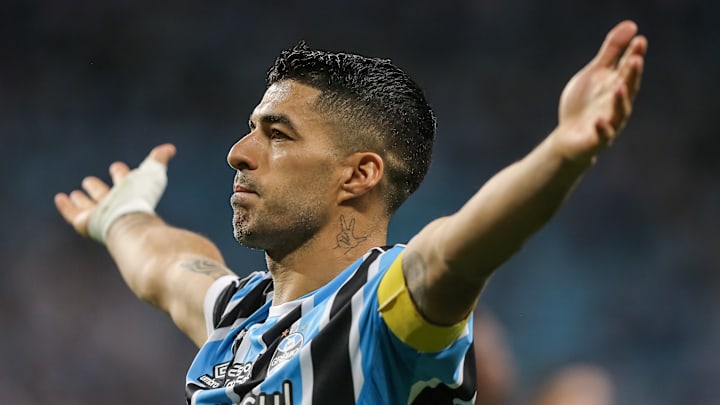The news of prolific Uruguayan forward Luis Suárez joining Inter Miami in the United States to reunite with Lionel Messi in Major League Soccer (MLS) did not go unnoticed. After all, it's not every day that two of the most renowned players on the planet come together for a new challenge, especially on American soil. This transfer, however, goes beyond a simple change of clubs; it brings with it a series of expectations and challenges for both the players and the MLS itself.
The saga leading up to the official announcement, as reported by "El País," finally concluded on Thursday (21), when Suárez and Inter Miami formalized a one-season contract, with the possibility of renewal for another year. This union raises questions and reflections on how the arrival of these stars will impact not only the Florida club but also the landscape of American soccer.
Follow MLS Multiplex on X (Twitter).
Amidst the rumors and speculations preceding the announcement, one piece of information stood out: Suárez will not occupy the Designated Player slot at Inter Miami, opting for a salary four times lower than what he earned at Grêmio, where he had the support of sponsors. This strategic decision raises questions about the MLS salary policy and the financial impact that renowned players can have on a club.
David Beckham's management of Inter Miami also comes into focus in this context. The former English player, now an entrepreneur and sports executive, seems determined to transform his club into a magnet for international stars. The partnership between Messi and Suárez, which has already shone on European fields, now gets a new stage, bringing with it the expectation of raising the competitive level of the MLS.
It's worth noting that Suárez arrives in the United States after a season with Grêmio, where he faced physical challenges but managed to recover and excel in the Brazilian scene. His performance of 54 games, with 29 goals and 17 assists, certainly leaves a mark in Brazilian football, but now the Uruguayan striker faces a new journey in a different football context.
Suárez's choice not to occupy the Designated Player slot in the MLS can be interpreted in different ways. On one hand, it demonstrates a commitment to following the financial rules of the league, thus avoiding salary overload. On the other hand, it raises questions about the MLS's ability to attract high-caliber players without exceeding its budgetary limits.

In recent years, the MLS has sought to establish itself as a competitive and attractive league for renowned players. The arrivals of figures like Zlatan Ibrahimović, David Villa, and Wayne Rooney have already demonstrated the attraction potential of the North American league. However, Suárez's signing, along with Messi's presence, represents a new level, a kind of affirmation that the MLS not only attracts stars in the twilight of their careers but also high-level players in their prime.
Suárez's strategy of accepting a considerably lower salary also highlights the issue of financial equity within the MLS. While Designated Players often receive exorbitant salaries, the Uruguayan's decision to fit within the salary cap can be seen as a gesture of solidarity with his teammates, but also as a sign that the league needs to rethink its salary approach to ensure more balanced competitiveness.
The partnership with Messi, of course, is one of the most exciting aspects of this transfer to Inter Miami. The two players have built a relationship on and off the field during the years they shared dressing rooms at Barcelona. Now, the opportunity to rekindle this partnership on American soil not only piques the curiosity of fans but also puts additional pressure on the shoulders of the two stars to deliver performances worthy of their reputations.
Messi and Suárez's influence on the development of soccer in the United States extends beyond the playing field. Their presence on social media, promotional events, and the global attention they bring to the MLS have the potential to further boost the sport's growth in the country. The question that arises is whether the league is ready to fully capitalize on this opportunity and leverage its popularity.
The success of this endeavor will not only depend on the talent of Messi and Suárez but also on Inter Miami's ability to build a competitive team around these two icons. Managing the squad, complementary signings, and the efficient integration of these stars into the group will be crucial factors for the club's performance in the upcoming MLS season.
Luis Suárez's arrival at Inter Miami, along with the stellar reunion with Messi, adds a fascinating chapter to the story of American soccer. The MLS, constantly seeking to assert its presence on the global stage, receives a injection of prestige and expectation with this signing. Now, we can only wait and see how this dynamic duo will shape the future of Inter Miami and, by extension, the landscape of soccer in the United States.
